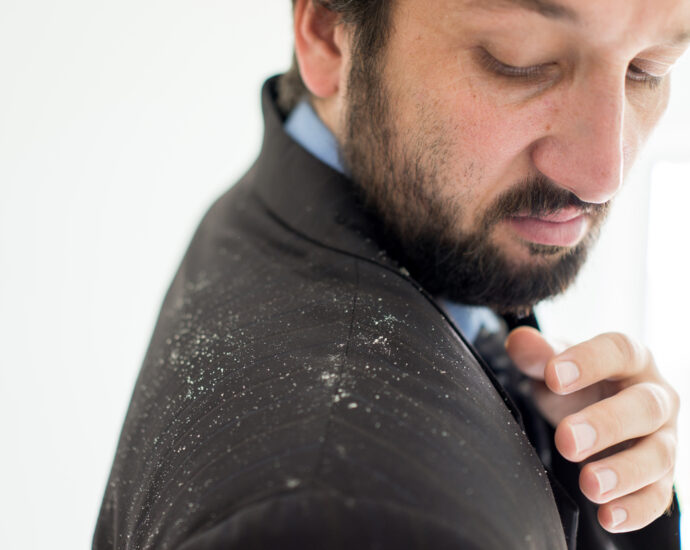A flaky scalp isn’t just uncomfortable—it can also be frustrating, embarrassing, and confusing to treat. Whether you’re seeing white flakes on your shoulders or experiencing itchiness and irritation, scalp flaking is often a sign of deeper scalp health issues.
While dandruff shampoos offer temporary relief, many contain harsh chemicals that may dry out your scalp even more. Fortunately, there are natural solutions that target the root causes of flaking while supporting a balanced, healthy scalp long-term.
This guide dives into the common causes of a flaky scalp and evidence-based natural remedies that can help you restore balance—without relying solely on synthetic ingredients.
-
Page Contents
What Causes a Flaky Scalp?
Before jumping into treatments, it’s important to understand the potential triggers behind flaking. Common causes include:
- Dry scalp: Often due to cold weather, dehydration, or over-washing
- Seborrheic dermatitis: An inflammatory condition linked to an overgrowth of yeast on the skin
- Psoriasis: An autoimmune disorder that causes thick, scaly patches
- Eczema (atopic dermatitis): Causes inflammation, itchiness, and flaking
- Product buildup: Hair products, oils, and residue can clog pores and irritate the scalp
- Allergic reactions or sensitivities: To shampoos, dyes, or fragrances
Identifying the root cause can help you select the most effective natural remedy.
These natural ingredients and methods support scalp health, reduce flaking, and calm inflammation—without the harsh side effects of chemical treatments.
Tea Tree Oil
- Why it works: Antimicrobial and antifungal properties help fight yeast and bacteria on the scalp.
- How to use: Add a few drops to your shampoo or mix with a carrier oil (like coconut or jojoba) and massage into the scalp. Leave on for 10–15 minutes, then rinse.
💡 Caution: Always dilute tea tree oil before applying directly to skin.
Apple Cider Vinegar (ACV)
- Why it works: ACV balances scalp pH, reduces fungus, and breaks down product buildup.
- How to use: Mix 1 part ACV with 2 parts water and apply as a rinse after shampooing. Let sit for a few minutes before rinsing with cool water.
✔️ ACV can also help soothe itchiness and improve overall scalp clarity.
Aloe Vera Gel
- Why it works: Deeply hydrating and anti-inflammatory, aloe vera calms irritation and supports healing.
- How to use: Apply fresh aloe vera gel directly to the scalp. Leave it on for 20 minutes, then wash as usual.
Bonus: Aloe also helps restore moisture and shine to dry, brittle hair.
Coconut Oil
- Why it works: Natural emollient that deeply hydrates and reduces fungal growth.
- How to use: Warm a small amount in your hands and massage into the scalp before bed. Cover with a shower cap and rinse out in the morning.
This is especially helpful for dry scalp flaking, as opposed to oily, dandruff-like flakes.
Witch Hazel
- Why it works: A natural astringent that reduces inflammation and itchiness.
- How to use: Mix witch hazel with water or aloe vera juice and apply to the scalp with a cotton pad. Let it sit for 15 minutes, then rinse.
Great for oily scalps or flaking linked to seborrheic dermatitis.
Probiotic-Rich Diet
- Why it works: Gut health plays a big role in skin and scalp balance. An overgrowth of yeast (like Malassezia) is often tied to imbalanced gut flora.
- What to eat: Include yogurt, kefir, sauerkraut, kimchi, or take a high-quality probiotic supplement to support microbial balance from within.
-
Lifestyle and Scalp Care Tips
Natural remedies work best when paired with supportive habits. Here’s how to create a scalp-friendly routine:
- Avoid over-washing: Washing too often strips the scalp’s natural oils. Aim for 2–3 times a week unless needed.
- Use sulfate-free shampoos: Harsh surfactants dry out the scalp and worsen irritation.
- Rinse with cool or lukewarm water: Hot water can inflame the scalp and increase flaking.
- Brush regularly: Gentle brushing promotes circulation and helps distribute natural oils.
- Stay hydrated: Dry skin and scalp often start with dehydration. Drink plenty of water daily.
- Manage stress: Chronic stress can trigger or worsen skin conditions like eczema and psoriasis.
-
When to See a Dermatologist
If natural remedies don’t bring relief after several weeks—or if your scalp is bleeding, scabbing, or extremely inflamed—it’s time to consult a healthcare provider. Persistent flaking may signal a more serious condition like psoriasis or a fungal infection that requires prescription treatment.
Conclusion: Flake-Free Starts with Scalp Health
A flaky scalp doesn’t have to be your norm. By understanding the root causes and using nature-based remedies, you can restore balance, soothe irritation, and support long-term scalp wellness.
Remember, the scalp is skin too—and healthy skin starts with nourishment, not just symptom suppression.
READ MORE: Hair Loss in Men: Causes, Treatments, and Prevention Tips
Sources:
https://my.clevelandclinic.org/health/symptoms/23326-dry-scalp
https://www.medicalnewstoday.com/articles/home-remedies-for-a-dry-scalp
https://healthsurgeon.com/health/kefir-health-benefits/
